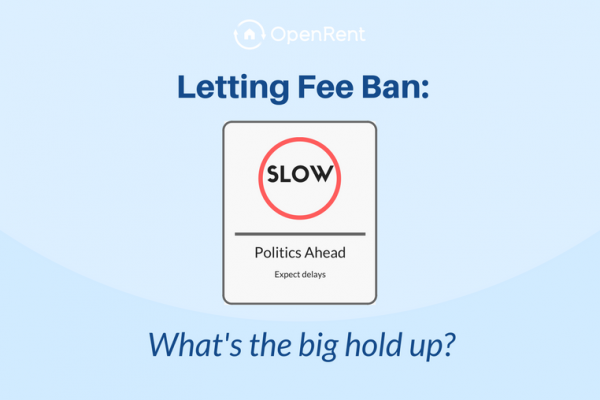The Tenant Fees Act 2019 marked a significant shift in the private rental sector in England, introducing strict regulations on what landlords and letting agents can charge tenants.
Designed to make renting fairer and more transparent, the legislation bans many common fees and imposes limits on others, such as tenancy deposits.
This guide breaks it all down, so you can stay compliant and keep things running smoothly with your tenants.
- What is the Tenant Fees Act 2019?
- What tenant fees are banned?
- Permitted payments
- Penalties for banned fees
- FAQs about the Tenant Fees Act 2019
Enjoy the benefits of self-managing your property without the hassle – let us show you how! Explore Rent Now
What is the Tenant Fees Act 2019?
The Tenant Fees Act 2019 came into force on 1st June 2019, changing the way landlords and letting agents could charge tenants.
Before the Act was introduced, it was common for tenants to face a range of upfront fees, including charges for viewings, administration, referencing, and even renewals. These costs often added up, making it difficult for tenants to afford moving into a property.
The law was introduced to make renting fairer and more transparent by banning unfair fees and capping deposits.
It applies to all privately rented properties in England and sets clear rules on what landlords can and cannot charge tenants.
What tenant fees are banned?
Under the Tenant Fees Act 2019, landlords and letting agents are no longer allowed to charge tenants for a range of costs that were once common.
The following fees are prohibited:
- Admin fees: You cannot charge tenants for preparing contracts or handling paperwork.
- Viewing fees: Charging someone just to view a property is no longer allowed.
- Referencing fees: Costs for checking a tenant’s credit or employment status must be absorbed by the landlord or agent.
- Renewal fees: Tenants cannot be charged for renewing a tenancy agreement.
- Third-party services: Fees for things like inventory checks or cleaning services are not allowed unless they are part of a permitted payment (e.g., damage caused by the tenant).
Failing to comply with these rules can lead to hefty penalties, so it’s important to make sure you’re only charging what is legally permitted.
By using our tenancy creation service, Rent Now, you can stay compliant effortlessly without the hassle of having to check everything yourself.
You might also be interested in…
- EICR Explained: Electrical Safety Certificates for Landlords
- Going Periodic: What Happens When a Tenancy’s Fixed Term Ends?
- How Landlords Can Manage Summer Turnover With Fewer Disputes
- Freehold, Leasehold and Commonhold Explained
- DIY Landlord: How to Rent Out Your Property Without an Agent
Permitted payments
Although the Tenant Fees Act 2019 bans many charges, there are still some payments that landlords can legally request called “permitted payments”. Here’s what you can charge for:
- Tenancy deposit: A refundable deposit to cover damages or unpaid rent is allowed, but it’s capped at five weeks’ rent for properties with an annual rent under £50,000, or six weeks’ rent if it’s higher.
- Holding deposit: You can take a holding deposit to reserve a property for a tenant, capped at one week’s rent. The law also sets rules for when it must be refunded.
- Early termination fees: If a tenant wants to leave early, you can ask them to cover the costs of finding a new tenant or the rent you lose in the meantime, as long as the charges are reasonable.
Landlords can also charge for specific situations when a tenant breaches the tenancy agreement or makes certain requests.
- Late rent fees: If rent is more than two weeks late, you can charge interest at a rate of up to 3% above the Bank of England base rate. This must be calculated pro rata based on the amount of overdue rent.
- Lost keys or security devices: You’re allowed to charge tenants for replacing lost keys or damaged security devices, but the cost must be reasonable, and you’ll need to provide evidence, such as a receipt.
- Changes to the tenancy agreement: If a tenant requests a change, such as adding a new tenant or allowing a pet, you can charge up to £50. Higher charges are only allowed if you can prove your costs exceed this, though such cases are rare.
Finally, optional fees are still legal but must be truly optional. For example, you can ask for the property to be returned cleaned to a professional standard, but tenants must have the option to either handle the cleaning themselves or pay for a professional service.
Before the tenant fees ban, tenants often paid around £300 in extra fees. OpenRent has never charged admin or agency fees, so tenants remain protected from unfair charges.
Can landlords charge bills as part of the rent?
Yes, landlords can include bills as part of the rent, but it must be clearly outlined in the tenancy agreement. The Tenant Fees Act 2019 allows landlords or letting agents to charge tenants for specific bills, such as:
- Council tax
- Utilities (e.g., gas, water, electricity)
- Television licence
- Communication services (e.g., broadband)
Including these costs in the rent can make things more convenient for tenants, especially in shared accommodation.
However, the charges must reflect the actual cost of these services and must be reasonable. Any excess paid will be a prohibited payment.
Penalties for banned fees
Landlords (or letting agents) who charge illegal fees may face paying huge fines.
A breach of the legislation if prosecuted will be a civil offence, with a fine of £5,000. If the offence is repeated within five years, then this would be a criminal offence with an unlimited fine.
Local Authorities also have the option of imposing a fine of up to £30,000 without pursuing prosecution. Moreover, tenants have the right to seek repayment of any illegal fees they’ve paid.
Charging illegal fees can also complicate eviction proceedings. If you issue a Section 21 notice (no-fault eviction), the court may refuse to grant a possession order if it finds that you’ve breached the Tenant Fees Act.
The enforcement of these rules is handled by local Trading Standards authorities, who investigate complaints about illegal fees.
To avoid these penalties, you should make sure that only the permitted fees outlined in the Act are charged.
If a tenancy began before 1st June 2019 and the deposit is more than five weeks’ rent, does the excess amount need to be returned?
No, unless the tenancy is renewed. If the tenancy becomes a periodic tenancy, it’s not considered a ‘new tenancy’ under the Tenant Fees Act.
However, if the tenancy is renewed, the deposit must not exceed the maximum of five weeks’ rent.
If the landlord has charged more than this limit, they will need to return any excess amount to the tenant.
Get unbeatable coverage on Rightmove, Zoopla, and other major property portals for just £49. Create your Advert Today
FAQs about the Tenant Fees Act 2019
1. Can I charge a pet fee?
No, you can no longer charge a separate fee for allowing a pet in the property. However, you can include a clause in the tenancy agreement that requires the tenant to return the property in good condition, and you can charge for any damage caused by the pet.
2. What happens if I don’t refund a holding deposit in the right circumstances?
If you don’t return a holding deposit when required by the rules, you could be in breach of the Tenant Fees Act. The holding deposit must be returned to the tenant within seven days of you deciding not to go ahead with the tenancy unless there is a reason as allowed by the Act for not returning it. If you do not comply, the tenant can seek legal action, and you may face penalties.
3. Can I charge for a guarantor fee?
No, you cannot charge a fee for a guarantor under the Tenant Fees Act 2019. Guarantor fees, like other admin fees, are prohibited.
4. Are there any exemptions to the Tenant Fees Act for certain types of tenancies?
Yes, there are some exemptions. For example, the Act doesn’t apply to long leases (over 21 years) or social housing tenancies. Also, the rules may differ for license agreements or tenancies where the tenant is a company rather than an individual (i.e., company lets).
5. What should I do if a tenant disputes a fee I’ve charged?
If a tenant disputes a fee you’ve charged, you should first make sure that the fee is compliant with the Tenant Fees Act 2019. If the fee is banned, you may need to refund the tenant. If the dispute continues, consider mediation or legal advice to resolve the matter, as tenants have the right to challenge unfair fees. Always keep detailed records and evidence of any charges to help resolve disputes efficiently.




Hi Sam,
I am hoping to start a new tenancy agreement for a flat. The current tenancy is coming to an end. However, one tenant is planning to stay and I will start a new tenancy with them. As a result, the agency is charging a £50 admin fee for change in sharer. I assume this is illegal as we are a starting a new tenancy agreement.
Thank you
Safa
Hi, yes that would be a prohibited payment under the Tenant Fees Act.
You could report this to your local authority’s trading standards team.
Sam
Hi Sam,
I have read the following on an advertisement:
‘NO DEPOSIT PAYABLE OR APPLICATION FEES* All you pay to move in is a Holding fee equivalent to 1 weeks rent to reserve the house , this is then credited towards your first month’s rent. You must then pay 1x month’s rent on the day you move in + a service fee equivalent to one weeks rent (7 days) plus VAT to Let alliance Nil Deposit Scheme.’
Is the ‘Service Fee’ allowable???
Thanks and regards, A.
Hi Antje,
Lucky Sam is on holiday and has taken all his specialist knowledge with him - so I don’t have all the answers for you. What I do know is that deposit replacement schemes are allowed and they can charge these costs - but they could have worded it in a much better way that wouldn’t raise questions over whether or not they were in breach of the TFA.
Gillian
Lucky Sam indeed!
Thanks Gillian!
Does one have to agree to the deposit replacement scheme? That week worth of rent is basically gone whilst you would get your deposit back unless something goes really wrong…
Thanks! Antje.